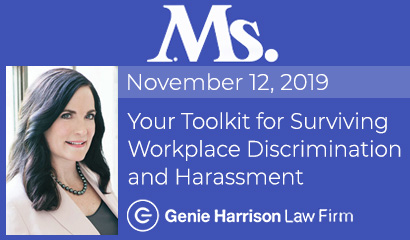In Case of Emergency: Your Toolkit for Surviving Workplace Discrimination and Harassment
November 12, 2019 — by Genie Harrison for Ms. Magazine
We all know the importance of engaging in physical and emotional self-care. For many of us, self-care includes ensuring that we get enough sleep, work out, stay hydrated and wear sunscreen.
But I answer dozens of calls and emails every week from women whose rights have been violated in the workplace—and it’s clear to me that most don’t know the basics of workplace self-care.
Workplace self-care starts with knowing your rights. The effects of harassment, discrimination and retaliation can be devastating. Understanding your rights and knowing what can be done to protect yourself will help you navigate difficult workplace dynamics and, in the best of cases, resolve problems if your employer acts properly.
You have the right not to be harassed or discriminated against based on a protected classification. Paying women less than men for substantially similar work is an example of discrimination based on sex, which is a protected class.
Under federal law, harassment can be the basis of a lawsuit if you must put up with it to keep your job or if it’s “severe or pervasive” enough to create an intimidating, hostile or abusive work environment. Under federal law, a single incident of rape at work unquestionably creates a hostile work environment—but petty slights, mere annoyances and less serious isolated incidents don’t rise to the level of illegality. To be considered unlawful under federal law, the conduct must create an environment that reasonable people would find intimidating, hostile or offensive. (Think: offensive jokes, slurs, epithets or name calling, physical assaults or threats, intimidation, ridicule or mockery, insults or put-downs, offensive objects or pictures and interference with work performance.)
State law and standards often differ from federal law, so it’s important to research the standards in your state. For example, California’s recently passed Omnibus Sexual Harassment bill is more protective of employees than federal law. Simply put, it takes less bad conduct in California to create liability for sexual harassment than under federal law.
You can sue for retaliation if you are treated adversely at work because you engaged in protected activity. An employer cannot take negative action against you—that is, demote, fire or subject you to a hostile work environment—because you were sexually harassed, acted as a whistleblower or reported conduct you believed to be illegal.
In most states, for the majority of injuries on the job other than those arising from protected class based harassment, discrimination and retaliation, employees must seek medical treatment and damages for pain and suffering through workers’ compensation, a separate dispute alternative for injuries that fall within the “compensation bargain,” not through the courts. Workers’ compensation makes presumptions in employees’ favor and limits employers’ financial exposure.
Most states offer online resources, and you can find help at these sites: the Equal Employment Opportunity Commission (EEOC), the Department of Labor (DOL) and other organizations focused on employee rights.
But regardless of where you live, you can protect yourself and your ability to bring a lawsuit through a number of do-it-yourself steps that prepare you to recount what happened—whether you bring your claim to your human resources department, a governmental agency or a private attorney.
Write a chronology of everything that happened—with dates, locations, witnesses and every detail you can recall of each offending event to date.
Keep a log of offending events going forward. Use notes on your phone, a note taking app, or an app for contemporaneous recording of events. I created a free app called Incident Genie to help document workplace misconduct.
If you feel safe doing so, report incidents to human resources, a supervisor or a higher up. Make sure to confirm what you reported in writing to prevent faulty recollection or outright denial in the future. Also consider reporting to the police.
Ask for help. Give your employer an opportunity to fix the problem so that you can stay at your job. Consider getting medical and/or psychological support, including stress or other medical leave. If you go on leave, provide your employer with a note from your doctor or psychologist that includes a specific return-to-work date.
Keep a log of how the events or conduct affect you. Include details such as nightmares, excessive sleeping or inability to sleep, inability to focus, depression, anxiety, grinding of teeth, irritability, nausea, panic, lack of appetite or the opposite, racing thoughts, fear and similar emotions. Because I know the importance of capturing this information, I created an attorney-client communication app called Damages Genie for you to use once you have a lawyer.
Reach out to a qualified lawyer in your area as soon as possible.
Engage in radical self-care during this stressful time. Exercise daily. Meditate. Take baths. Stream your favorite shows. Wear fuzzy socks to bed. Strive for underwhelm. Seek out support, whether from a private therapist, through your insurance, or at a low or no-cost clinic.
If your employer is not interested in playing by the rules, using the workplace self-care toolkit will help you hold those who violated your rights accountable for the harm they caused. Most importantly, know that, with the right help, things will get better.
Read the story above at Ms. Magazine >
About Genie Harrison
Genie Harrison represents plaintiffs in employment and sexual abuse cases as lead trial attorney at the Genie Harrison Law Firm in Los Angeles and is the Vice President of Consumer Attorneys Association of Los Angeles. She credits Ms. as a lifeline, during her college years, to the feminist movement; now, she writes about legal and social issues to provoke action. You can contact her at genie@genieharrisonlaw.com.





